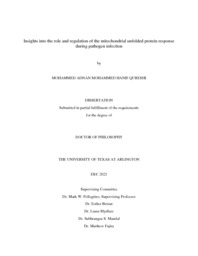
ATTENTION: The works hosted here are being migrated to a new repository that will consolidate resources, improve discoverability, and better show UTA's research impact on the global community. We will update authors as the migration progresses. Please see MavMatrix for more information.
Show simple item record
| dc.contributor.advisor | Pellegrino, Mark | |
| dc.creator | Qureshi, Mohammed Adnan | |
| dc.date.accessioned | 2022-01-25T18:21:34Z | |
| dc.date.available | 2022-01-25T18:21:34Z | |
| dc.date.created | 2021-12 | |
| dc.date.issued | 2021-11-08 | |
| dc.date.submitted | December 2021 | |
| dc.identifier.uri | http://hdl.handle.net/10106/30195 | |
| dc.description.abstract | Mitochondria are essential cellular organelles known for their role in energy production, apoptosis, aging, calcium signaling and others. Due to their essential nature, mitochondria are often under attack by numerous pathogens as a means to promote their infection. Consequently, mitochondrial function is often perturbed during infection, a phenomenon that must be mitigated in order for the host to survive. Cells employ various tactics to repair damaged mitochondria during stresses such as pathogenic infection. One way of countering mitochondrial stress is through the recovery mechanism known as the mitochondrial unfolded protein response (UPRmt). The UPRmt supports mitochondrial recovery by promoting mitochondrial proteostasis via chaperones and quality control proteases, as well as regulating the detoxification of free radicals, and supporting metabolic adaptations. In addition, the UPRmt is also coupled to the regulation of innate immunity, to defend the host against pathogenic infections. However, pathogens have also evolved means to subvert this stress response pathway in an effort to out-maneuver the host. The following dissertation explores the relationship between the UPRmt and bacterial infection by first characterizing an output of the UPRmt that has direct antimicrobial activity. Second, the mechanism by which an opportunistic pathogen, Pseudomonas aeruginosa, represses the UPRmt protective pathway is explored both at the level of pathogen and the host. | |
| dc.format.mimetype | application/pdf | |
| dc.language.iso | en_US | |
| dc.subject | Mitochondrial unfolded protein response | |
| dc.subject | Pathogen | |
| dc.subject | C. elegans | |
| dc.title | Insights into the role and regulation of the mitochondrial unfolded protein response during pathogen infection | |
| dc.type | Thesis | |
| dc.degree.department | Biology | |
| dc.degree.name | Doctor of Philosophy in Quantative Biology | |
| dc.date.updated | 2022-01-25T18:21:35Z | |
| thesis.degree.department | Biology | |
| thesis.degree.grantor | The University of Texas at Arlington | |
| thesis.degree.level | Doctoral | |
| thesis.degree.name | Doctor of Philosophy in Quantitative Biology | |
| dc.type.material | text | |
Files in this item
- Name:
- QURESHI-DISSERTATION-2021.pdf
- Size:
- 5.680Mb
- Format:
- PDF
This item appears in the following Collection(s)
Show simple item record


